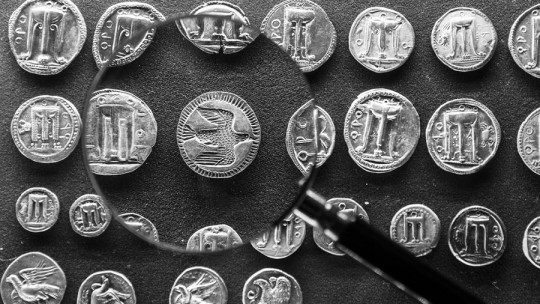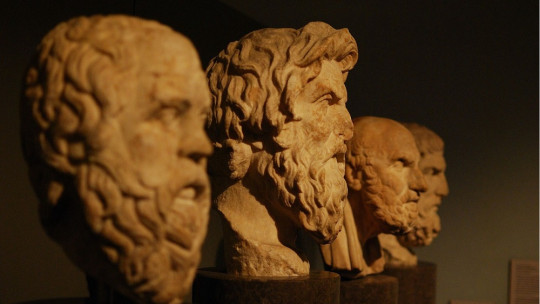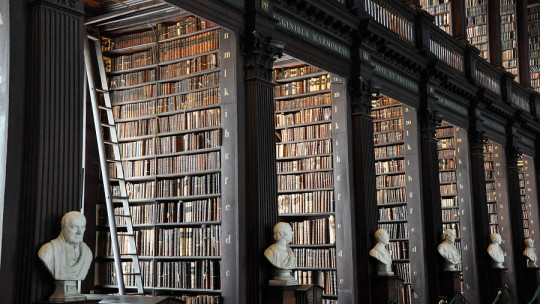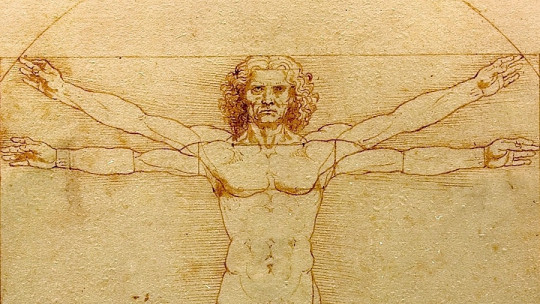
In the same way that Christians believe in God, Muslims in Allah, or Jews in Yahweh, there are people who do not believe in any of that. Atheism is the non-belief in deities or that they determine our destiny, fortunes and misfortunes.
This is nothing new, of course, but it is surprising that, When delving into the origins of atheism, we see that it is a fairly ancient religious position
Next we are going to take a trip through time, discovering who the first atheists were philosophically speaking and how non-belief has been treated throughout history.
What are the origins of atheism?
Although the word “atheism” is relatively modern, having its origin in the 16th century and being, at the time, a neologism from the ancient Greek “átheos” (without god, denial of god), the truth is that the philosophical position behind of the term is very old. Today we understand the word atheism as the ideological and religious position in which the existence of god, deities or entities that determine the fate of people is denied or not accepted, a definition not prior to the 18th century, when the word went from an insult to a “positive” concept.
As surprising as it may seem, the idea that gods or deities do not exist appears to be as old as religions themselves. Anthropologically, the origins of atheism have been investigated, trying to discover whether in the most “primitive” cultures there were divergent positions regarding the deity of the tribe, or whether they were critical of what the other members of the group believed. Although research has been very extensive, it is difficult to know to what extent non-belief appeared in these cultures.
What is certain is that, of course, The belief that atheism, as a philosophical position, has its origins in the Age of Enlightenment is false Although the Enlightenment undoubtedly implied greater freedom of expression, which also included religion, the truth is that we can find atheistic positions since ancient times, with civilizations such as Greece, Rome, China and the India. Next we will see how non-belief has been established in the philosophical thinking of various cultures.
1. Ancient Age
As a philosophical current, atheism began to manifest itself at the end of the 6th century BC. C. in Europe and Asia At this time, in Classical Greece, the word “átheos” already existed, although with a different definition than the one we give it today, appearing between the 5th and 6th centuries BC. It referred to that person who had ceased their relationships. with the gods and, on many occasions, it was used as an insult, meaning an evil person who denied or disrespected the gods.
We have as an interesting atheistic antecedent Classical Greece, with the case of Socrates. Although his atheism could not properly be considered non-belief in God, it could be questioned the existence of the ancestral gods It is for this reason that Socrates was executed by making him drink hemlock. Likewise, it should be said that the execution of Socrates, rather than for heresy, was due to political reasons, since, relatively, in Classical Greece atheism was more or less tolerated, depending on the polis and the historical moment.
There are many other classical philosophers who resist the belief in divinities. another thinker, Carneades of Cyrene, who headed Plato’s Academy in the 2nd century BC. C. considered that believing in gods was illogical Some time later, Xenophanes of Colophon criticized the idea of anthropomorphic gods, considering them a human and corrupt invention. Likewise, it should be said that Xenophanes was a supporter of pantheism, that is, the position that everything is found in all things and is, technically, a religion, in its own way.
Diagoras of Melos received quite a bad reputation for being considered the first atheist in Classical Greece The atomists Leucippus and Democritus later defended a materialist vision of the world, in which the intervention of the gods had no place. We also have other figures considered atheists, or at least defenders of the position that deities could not exist, such as Anaximenes, Heraclitus and Prodicus of Ceos, also supporters of a completely materialist point of view and without thinking about the spiritual.
Leaving aside the Western world, we move on to Ancient India, a place that was the cradle of numerous philosophical schools in which an atheistic vision of life was promulgated. Chárvaka also emerged, an anti-theistic philosophical current, one of the most explicit of the time, and Jainism, which conceives the idea that the world is an eternal and beginningless element.
In China we have Taoism, which defends the nonexistence of a god Taoists consider that a superior deity is unnecessary, since human beings are in perfect harmony with nature.
In this same country we have Buddhism, in which the existence of a single founding God is not conceived, with the teachings of Buddha Gautama being those that serve as psychological and spiritual training to find ourselves internally, although they do believe in deities and other entities. supernatural, which we cannot speak of atheism in the strict sense.
2. Middle Ages, Renaissance and Reformation
In the Middle Ages, atheism was very frowned upon in the West. so bad that There are not many figures who dared to make their atheistic positions known; there was fear of having to defend himself before a court of the Inquisition and end up confessing under the most creative torture. Freedom of thought was conspicuous by its absence, and if it was already a scandal to believe in another god other than the Christian, doubting the existence of a creative entity was already the last straw.
Fortunately the situation changes beginning with the Renaissance, followed by the Protestant Reformation. Greater criticism of religious institutions and beliefs emerged, progressively shaping the idea of modern atheism. In fact, the term “athéisme” was first coined in France in the 16th century, used as a form of accusation for those who rejected God or divinity in their intellectual debates.
Although there was much more freedom of thought than during the Middle Ages, it would not be with the emergence of the Protestant Reformation and, later, the Enlightenment. Being a non-believer was still frowned upon and there is evidence that during the 16th and 17th centuries the word “atheist” was used exclusively as an insult that no one wanted to receive, since there were quite a few who ended up being executed for suspicion of atheism, among whom we can find the following cases:
As for those accused of atheism who were saved, we can find great figures of Western thought such as the English materialist Thomas Hobbes, who managed to save himself by denying the charges of atheism. The reason for the suspicion was that his theism was unusual, since he considered that God had to be material. In 1675 the philosopher Baruch Spinoza had to give up publishing his work Ethics since it was considered blasphemous and atheist by theologians along with other banned works that were only known posthumously.
3. The Age of Enlightenment
The Enlightenment is one of the most important cultural periods in the West, since it brought with it great scientific and philosophical advances, along with greater freedom of thought. This era is traditionally associated with the phrase “I don’t agree with what you say, but I will defend with my life your right to say it,” supposedly said by the French philosopher Voltaire.
Denis Diderot, one of the most important philosophers of the Enlightenment and editor of the best-known work of dissemination of knowledge of the time, The encyclopedia, was accused of being an atheist for challenging the prevailing religious dogmas, especially the Catholic one. In his work he writes that reason is the virtue of the philosopher, while grace is the virtue of the Christian. Grace determines the actions of the Christian and reason those of the philosopher. For opinions like this Diderot was imprisoned for a short period.
As time went by, the word atheism was no longer a dangerous accusation In the 1770s, the act of questioning the existence of God was already better seen, although, of course, with its limitations. The first philosopher of the time to deny the existence of God and defend his atheism was Baron d’Holbach, with his work published in 1770. Nature System. Along with philosophers such as Denis Diderot, Jean Jacques Rousseau, David Hume, Adam Smith, and Benjamin Franklin, he criticized religion.
But despite the greater freedom of expression, censorship and repression were still in force D’Holbach published his works under the pseudonym Jean-Baptiste de Mirabaud to avoid religious persecution. Furthermore, his works and those of several earlier philosophers appeared in the Index Librorum Prohibitorum, a compilation made by the Holy See that included those books that should not be read under any circumstances if you wanted to be a good Christian. This book had editions until 1948, being suppressed in 1966.
Conclusions
The origins of atheism are very deep and extensive if taken from a historical perspective. Surely, ancestral cultures expressed, in one way or another, some opinion critical of the belief in group deity although it is difficult to be sure of this since, on many occasions, the cultural remains that come to us from our oldest ancestors are offerings to gods or other ritual objects.
What we can be sure of is that atheism, as a religious and philosophical position, does not have its origins in the Enlightenment, but was already well present in ancient times. In both Europe and Asia, critical positions against the ancestral gods had their own schools, more or less accepted depending on the city-state or the historical moment that was being experienced.
With the arrival of the Middle Ages comes the darkest and most gloomy repression against any idea contrary to the idea of the Christian God, and a little more freedom would only be gained with the emergence of the Renaissance, the Protestant Reformation and, finally, the Century of the lights.








